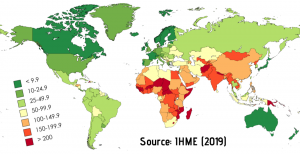Air pollution: Difference between revisions
mNo edit summary |
|||
| Line 3: | Line 3: | ||
==Global Inequality== | ==Global Inequality== | ||
[[File:Air pollution inequality.png|thumb|Yellow, orange, and red indicate increasingly higher levels of air pollution (by | [[File:Air pollution inequality.png|thumb|Yellow, orange, and red indicate increasingly higher levels of air pollution (by nation-state)]] | ||
The impacts of air pollution are experienced unevenly on a global scale. A 2013 World Bank report found that "children under age 5 in lower-income countries are more than 60 times as likely to die from exposure to air pollution as children in high-income countries."<ref>https://www.commondreams.org/news/2016/09/08/making-case-clean-air-world-bank-says-pollution-cost-global-economy-5-trillion</ref> This report found that both deaths and nonfatal illnesses attributable to air pollution were disproportionately twice as common in "developing" (poorer/colonized) nations as opposed to "developed" (wealthier/colonizer) nations. | The impacts of air pollution are experienced unevenly on a global scale. A 2013 World Bank report found that "children under age 5 in lower-income countries are more than 60 times as likely to die from exposure to air pollution as children in high-income countries."<ref>https://www.commondreams.org/news/2016/09/08/making-case-clean-air-world-bank-says-pollution-cost-global-economy-5-trillion</ref> This report found that both deaths and nonfatal illnesses attributable to air pollution were disproportionately twice as common in "developing" (poorer/colonized) nations as opposed to "developed" (wealthier/colonizer) nations. | ||
=Sources= | =Sources= | ||
Revision as of 15:01, 14 July 2022
Air pollution is the single greatest cause of preventable mortality today, killing approximately nine million people every year. Air pollution today is proximately caused, above all else, by particles from fossil fuel combustion contaminating the air; fossil fuel pollution accounts for approximately two-thirds of all air pollution. As the cause of numerous diseases including lung cancer, heart attacks, and depression, the air pollution epidemic is the world's most deadly ongoing epidemic and a foremost example of how the breakdown of human health and environmental health are intertwined.
Global Inequality
The impacts of air pollution are experienced unevenly on a global scale. A 2013 World Bank report found that "children under age 5 in lower-income countries are more than 60 times as likely to die from exposure to air pollution as children in high-income countries."[1] This report found that both deaths and nonfatal illnesses attributable to air pollution were disproportionately twice as common in "developing" (poorer/colonized) nations as opposed to "developed" (wealthier/colonizer) nations.
